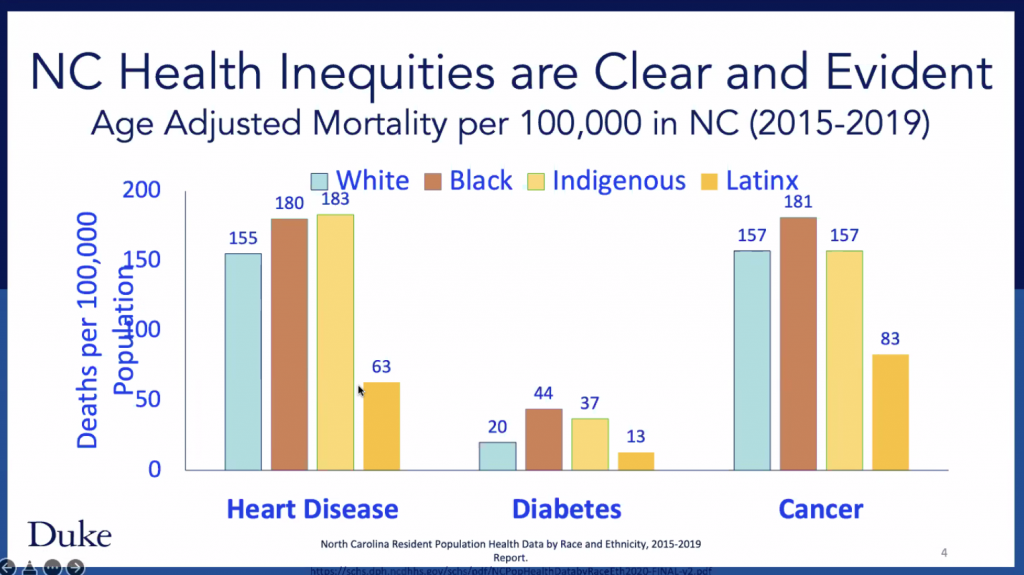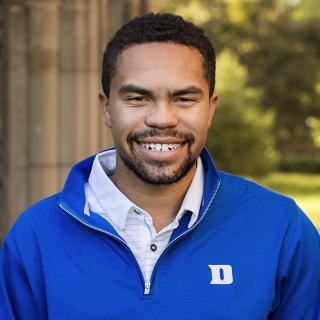“Community engagement” and “health disparities” are some of the most trending terms in healthcare right now, but what are people actually doing about them? On Wednesday, February 2, panelists in healthcare sat down as part of Duke’s Research Week to talk about ways in which they and their organizations were actively addressing health disparities by focusing on communities. (View the session)
Dr. L. Ebony Boulware, professor at the Duke University School of Medicine and director of the Duke Clinical and Translational Science Institute, set the stage by defining health equity for the vast number of us that might only have read about it in a mission statement or an article but weren’t exactly sure how it was conceptualized. To work towards health equity, she said, means that “everyone has an opportunity to attain their full health potential regardless of any socially defined circumstance.” These circumstances could range from poverty to structural racism, but the main theme was that community engagement is a key player as we think about how best to achieve equity.

COVID-19 is a great example of why health equity matters, as we ponder whether the pandemic could have turned out any different if more people had access to vaccines, personal protective equipment, and the capacity to socially distance. Dr. Michael Cohen-Wolkowiez, a professor of Pediatrics at the Duke University School of Medicine, and Dr. Giselle Corbie-Smith, a professor at the UNC School of Medicine gave a pertinent example of their work addressing the health disparity on our minds right now– access to COVID-19 testing – and the RADx program out of the NIH that is funding work to address this problem.
But even before COVID-19, attaining health equity was a tough goal to address for virtually every country in the world. Health equity isn’t just a nicety, it affects how long we are alive. And while progress in terms of life expectancy differences is improving, much work remains to be done to close the myriad gaps that remain. Dr. Tyson Brown, associate professor of Sociology at Duke, highlighted his research into structural racism to stress the fact that structural racism is toxic for population health and disproportionately affects people of color.

Dr. Schenita Davis Randolph, a registered nurse and professor at the Duke School of Nursing, zoomed in a little to highlight what true community engagement looks like. As part of her lab’s research to improve uptake of pre-exposure prophylaxis (PrEP) treatment to address HIV in Black women, they designed an intervention for beauty salons, known to be trusted venues for health promotion in the Black female community. But “how do we use community engagement so it’s not just a checkmark?” This, among other pressing challenges to community engagement in addressing health disparities, is what Dr. Keisha Bentley-Edwards, developmental psychologist and professor at the Duke University School of Medicine, talked about.
As the panel discussion came to a close, a key message emerged. As Dr. Davis remarked, both disparities and the communities that are hurt by them are complex, and so until we take a multi-faceted approach to understanding them, we continue to grasp for the ultimate goal of health equity.
But while these disparities are complex, they are certainly not unsolvable. Dr. Corbie-Smith emphasized that “we have a clear understanding of of how health disparities work.” All that’s left to do is solve them, and Dr. Bentley-Edwards highlights this move from awareness to solutions as a challenge to achieving health equity. Perhaps most significantly, though, it’s important to move from inertia to action. While there are seemingly thousands of ways in which communities in the U.S and around the world face barriers to health access, it’s important to do something – however small. As Dr. Bentley-Edwards concluded, by everyone working within their sphere of influence to close the health equity gap, that sphere becomes bigger and bigger and the gap becomes smaller and smaller.




